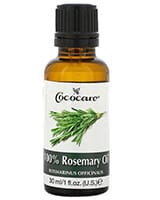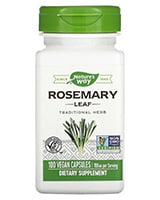

Rosemary (Rosmarinus officinalis), a fragrant herb native to the Mediterranean, has long been celebrated for its versatile uses and benefits. Known for its needle-like leaves and distinctive aroma, rosemary has transcended its origins as a culinary staple to become a symbol of remembrance and a key player in traditional and modern medicine. This article delves into the multifaceted nature of rosemary, exploring its role in enhancing cognitive function, its medicinal properties, and its culinary versatility.
Benefits
Cognitive Enhancement: Rosemary’s reputation as a memory enhancer is not just folklore. Studies have shown that the inhalation of rosemary essential oil can lead to improved alertness and cognitive performance[1]Nasiri, A., & Boroomand, M. M. (2021). The effect of rosemary essential oil inhalation on sleepiness and alertness of shift-working nurses: A randomized, controlled field trial. Complementary Therapies in Clinical Practice, 43, 101326. https://doi.org/10.1016/j.ctcp.2021.101326. This is attributed to compounds like 1,8-cineole, which act as acetylcholinesterase inhibitors, boosting acetylcholine levels in the brain, similar to drugs used in dementia treatment.
Medicinal Uses: Beyond its cognitive benefits, rosemary is known for its therapeutic properties. It exhibits anti-inflammatory and antioxidant effects, making it beneficial for boosting the immune system and improving blood circulation[2]Nordqvist, J. (2023). Everything you need to know about rosemary. Medical News Today. Retrieved from https://www.medicalnewstoday.com/articles/266370. These properties contribute to its potential in treating conditions like Alzheimer’s disease, as its bioactive compounds, including phenolic diterpenes and triterpene acids, offer neuroprotective effects[3]Habtemariam, S. (2016). The therapeutic potential of rosemary (Rosmarinus officinalis) diterpenes for Alzheimer’s disease. Evidence-Based Complementary and Alternative Medicine, 2016, Article 2680409. https://doi.org/10.1155/2016/2680409.
Side Effects
While rosemary is generally considered safe when used in typical culinary amounts, it’s important to be aware of its potential side effects, especially when consumed in medicinal doses. High doses of rosemary may lead to gastrointestinal irritation, kidney damage, and even allergic reactions in some individuals. Pregnant women are advised to use rosemary cautiously, as excessive amounts might affect the fetus or lead to miscarriage[4]Lemonica, I. P., Damasceno, D. C., & Di Stasi, L. C. (1996). Study of the embryotoxic effects of an extract of rosemary (Rosmarinus officinalis L.). Brazilian Journal of Medical and Biological Research, 29(2), 223-237. PMID: 8731353. It’s also important to note that rosemary can interact with certain medications, such as blood thinners, ACE inhibitors, diuretics, and lithium, potentially altering their effects.
Rosemary Oil
Rosemary oil, derived from the leaves of the rosemary plant, is a highly concentrated essence widely used for its health and beauty benefits. It’s known for its ability to stimulate hair growth, improve scalp health, and its use in aromatherapy for stress relief. When applied topically, rosemary oil can improve circulation, which is beneficial for skin health and healing. However, it should be used with a carrier oil to prevent skin irritation. Inhaling rosemary oil has been shown to reduce cortisol levels, which can alleviate stress and improve concentration and memory.
Rosemary Water
Rosemary water is another delightful way to enjoy the benefits of this versatile herb. Often used for its potential cognitive and health benefits, rosemary water can be easily prepared at home by steeping fresh or dried rosemary in boiling water. It is believed to harness the herb’s antioxidant properties, which can aid in improving digestion, enhancing skin health, and even providing a mild boost in memory and concentration. Some people also use rosemary water as a hair rinse for its purported benefits in strengthening hair and adding shine.
Rosemary in Culinary Practices

Rosemary’s robust and aromatic flavour makes it a favourite in culinary circles. Its piney and slightly bitter taste pairs wonderfully with a variety of dishes, including meats like lamb and chicken, vegetables, soups, and sauces. Rosemary is not just a flavour enhancer; its high antioxidant content also contributes to the nutritional value of the dishes it graces. Fresh rosemary often imparts a more intense flavour than dried, and it can be used whole, chopped, or as an infusion. In Mediterranean cuisine, rosemary is a staple, reflecting the region’s preference for fresh, aromatic, and healthy ingredients.
Practical Applications and Usage
Rosemary’s versatility extends beyond the kitchen and medicine cabinet into everyday practical uses. For those interested in gardening, rosemary is a hardy plant that can be grown indoors or outdoors, requiring minimal care. It thrives in well-drained soil and plenty of sunlight, making it a perfect addition to a home garden or windowsill.
In terms of storage, fresh rosemary can be kept in the refrigerator, wrapped in a damp paper towel, or frozen in ice cube trays with water or olive oil for long-term use. Dried rosemary should be stored in an airtight container in a cool, dark place to preserve its flavour and medicinal properties.
For DIY enthusiasts, rosemary can be used to create homemade skincare products, such as toners and balms, due to its anti-inflammatory and antibacterial properties. It can also be infused into oils and vinegar to create flavorful and healthful condiments.
Buy Rosemary Online Review Comparison Table
| Product | Company | Quantity | Price | Country | Website |
 Rosemary Oil | iHerb | 1 fl oz (30 ml) | $6.63 |  Worldwide, US, AU | Visit Website >> |
 Rosemary Leaf | iHerb | 350 mg (100 pills) | $4.08 |  Worldwide, US, AU | Visit Website >> |
Safety and Precautions
While incorporating rosemary into your daily routine can offer numerous benefits, it’s crucial to approach its use with an understanding of safety and precautions. As with any herb or supplement, moderation is key. Excessive consumption of rosemary, especially in oil form, can lead to adverse effects such as vomiting, spasms, or even pulmonary edema in extreme cases.
Individuals with certain health conditions, such as high blood pressure or epilepsy, should consult with a healthcare professional before using rosemary in medicinal amounts. It’s also important to consider potential interactions with prescription medications, as rosemary can affect the way certain drugs are metabolized by the body.
In conclusion, rosemary is a remarkable herb with a wide array of uses and benefits. From enhancing memory and cognitive function to adding a burst of flavour to your favourite dishes, rosemary truly is a herb of many talents. Whether you’re using it for health, culinary, or cosmetic purposes, this aromatic herb can make a valuable and versatile addition to your daily life. Remember to enjoy rosemary in moderation and consult with healthcare professionals when necessary to ensure its safe use.
References
| ↑1 | Nasiri, A., & Boroomand, M. M. (2021). The effect of rosemary essential oil inhalation on sleepiness and alertness of shift-working nurses: A randomized, controlled field trial. Complementary Therapies in Clinical Practice, 43, 101326. https://doi.org/10.1016/j.ctcp.2021.101326 |
|---|---|
| ↑2 | Nordqvist, J. (2023). Everything you need to know about rosemary. Medical News Today. Retrieved from https://www.medicalnewstoday.com/articles/266370 |
| ↑3 | Habtemariam, S. (2016). The therapeutic potential of rosemary (Rosmarinus officinalis) diterpenes for Alzheimer’s disease. Evidence-Based Complementary and Alternative Medicine, 2016, Article 2680409. https://doi.org/10.1155/2016/2680409 |
| ↑4 | Lemonica, I. P., Damasceno, D. C., & Di Stasi, L. C. (1996). Study of the embryotoxic effects of an extract of rosemary (Rosmarinus officinalis L.). Brazilian Journal of Medical and Biological Research, 29(2), 223-237. PMID: 8731353 |

Leave a Reply